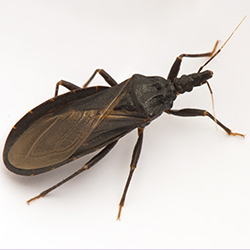Chagas disease and Kissing Bugs

What is Chagas disease?
Chagas disease is caused by a single-celled parasite, Trypanosoma cruzi and is most commonly spread in Mexico, Central and South America. Local spread may occur in the U.S., but it is not common.
Chagas disease has two phases. The acute phase usually goes unnoticed because most people have no symptoms or only have a mild illness that occurs 1-2 weeks after exposure. Sometimes, the only sign of exposure is a swollen eyelid on one side of the face where the bug bit. The chronic phase can occur in a small number of people years to decades after exposure. Chronic Chagas disease may result in severe illness.
How does Chagas disease spread?
-
Blood-feeding insects called triatomine bugs (kissing bugs) are the most common way Chagas disease spreads. The parasite lives in the bug’s gut and is spread through its feces (poop). The bug bites, then defecates (poops), and the parasite enters a bite wound, eyes, nose or mouth. Some species of kissing bugs spread the disease more easily. For example, the South American species usually defecate right after feeding, while still on the person. This increases the risk of disease.
-
The parasite also can be spread from eating food or beverages contaminated with bug feces, eating uncooked meats from infected animals, from mother-to-baby, through blood products, or by eating the bugs.
-
Dogs commonly eat the “kissing bugs” and are at higher risk of infection.
Does Colorado have kissing bugs or Chagas disease?
- Colorado does have kissing bugs. They are nesting bugs, typically associated with rodent nests. The most common species in our state is Triatoma protracta.
- Colorado’s common kissing bug is capable of spreading Chagas disease but is not very good at it. That’s because the bug usually defecates after it is off the person.
- If you or your pets may have been bitten by a kissing bug, call your healthcare provider or veterinarian.
- Health care providers or veterinarians who have questions about testing patients for Chagas disease can call the state health department
at 303-692-2700.
Colorado kissing bug study
CDPHE is not currently able to accept kissing bug suspects for identification.
Some useful resources on Chagas disease and kissing bugs are: